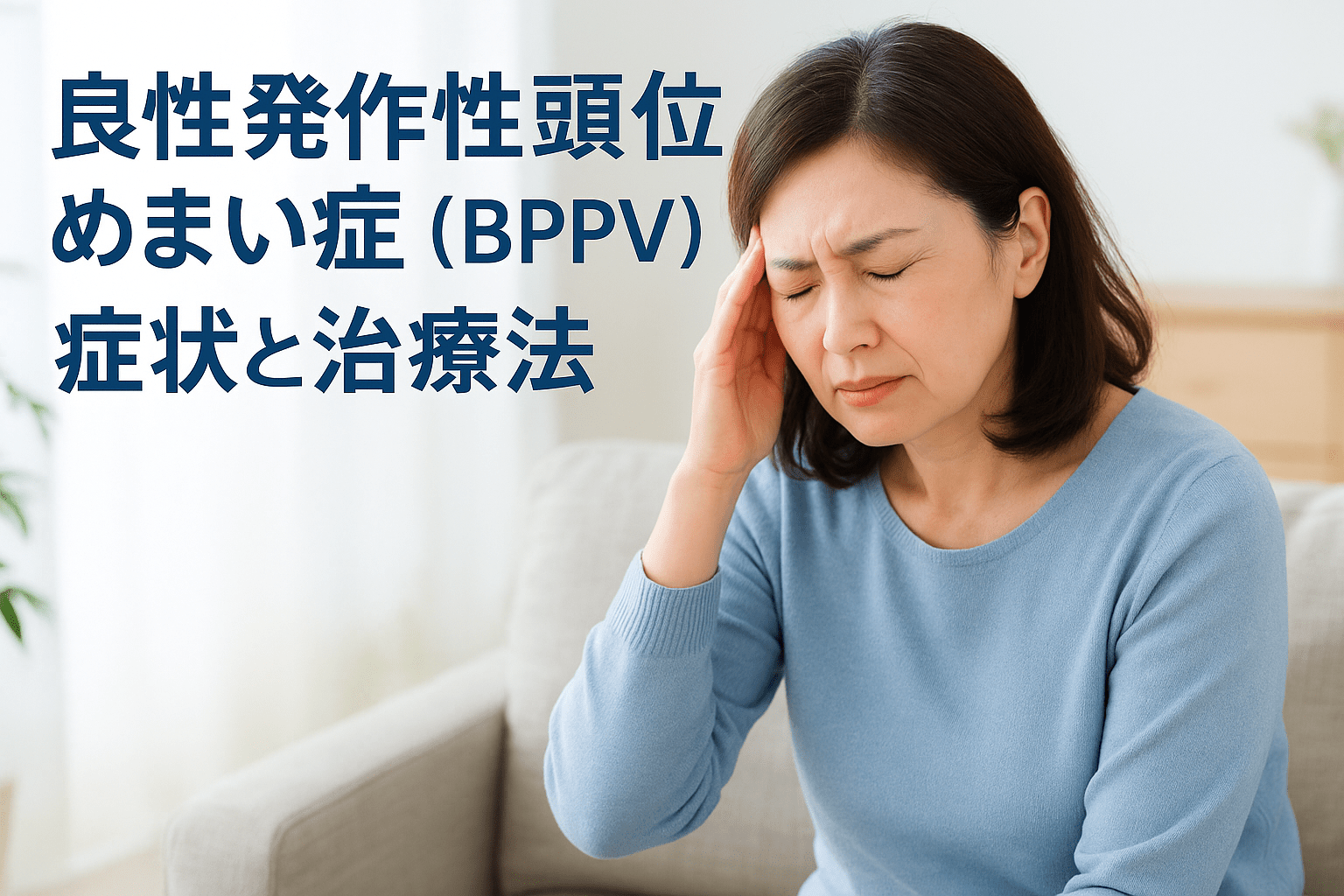「朝起きた時に天井がぐるぐる回る」「寝返りを打つとめまいが…」そんな経験はありませんか?
良性発作性頭位めまい症(BPPV)は耳石のずれが原因で起こるめまいです。
症状や治療法、予防の工夫をしもやま内科(船橋市)の専門医がわかりやすく解説します。

原因
耳の奥にある内耳には、体のバランスを保つセンサーがあります。その中に耳石(じせき)という小さな粒(炭酸カルシウム)が存在しています。
この耳石が何らかの原因ではがれて三半規管という管の中に入り込んでしまうと、頭の動きに対して異常な信号が脳に送られ、めまいが起こります。
症状
- ぐるぐると回るようなめまい(回転性めまい)が、特定の頭の動きで起こります
- めまいは数秒〜1分程度でおさまります
- 寝返り、起き上がり、頭を上や下に向けたときなど、特定の動作で起こりやすい
- 吐き気や嘔吐を伴うことがあります
- めまい時に目が勝手に動く(眼振)ことがあります
- 耳が聞こえづらい・耳鳴りは通常ありません
診断
問診と、頭の位置を変えてめまいや眼の動き(眼振)が誘発されるかどうかの検査(例:Dix-Hallpike検査)で診断します。
治療
1. 自然に改善する場合も
時間がたつことで自然に治ることも少なくありません。
2. めまい体操(理学療法)
耳石を正しい位置に戻すための体操が効果的です。
- エプリー法: 医療機関で指導する体操で、耳石を元の場所に誘導します
- ブラント・ダロフ法: ご自宅で行える体操です
3. 薬物療法
吐き気止めやめまいを和らげる薬を使う場合もありますが、これは症状をやわらげる目的で、根本治療ではありません。
4. 手術(まれなケース)
ごくまれに、他の治療で改善しない場合に手術が検討されます。
予防の工夫
- 枕を少し高めにして寝ると、耳石が三半規管に入りにくくなることがあります
- 急な頭の動きを避けるよう意識しましょう
- バランス感覚を養うため、無理のない範囲で体を動かすこともおすすめです
よくあるご質問(FAQ)
- 良性発作性頭位めまい症は自然に治りますか?
- 多くの場合、数週間〜数か月で自然に改善することが多いですが、早く改善させたい場合はめまい体操(エプリー法など)が有効です。
- 繰り返すことはありますか?
- はい。良性発作性頭位めまい症は一度治っても再発することがあります。その際は再度体操や治療を行えば改善が期待できます。
- 自宅でできる予防法はありますか?
- 枕を少し高めにして寝る、急な頭の動きを避けるなどの工夫が予防につながる場合があります。
- 薬で治りますか?
- 薬はめまいのつらさや吐き気をやわらげる目的で使いますが、耳石の位置を戻す根本治療には体操(エプリー法など)が効果的です。
- どの診療科にかかれば良いですか?
- 耳鼻咽喉科や、めまいを診療している内科・神経内科などの医療機関に相談されることをおすすめします。
おわりに
良性発作性頭位めまい症は、適切な治療によって多くの方が改善を実感できるめまいです。
もし「自分も当てはまるかも」と感じた方や、めまいでお困りの方は、どうぞ耳鼻咽喉科や専門医にご相談ください。
早めに対処することで、安心して日常生活を送る助けになります。
👨⚕️ この記事の監修医師
しもやま内科 院長
日本内科学会 総合内科専門医
日本糖尿病学会 糖尿病専門医・指導医
日本循環器学会 循環器専門医
日本老年医学会 老年病専門医・指導医
日本甲状腺学会 甲状腺専門医
糖尿病、甲状腺、副腎など内分泌疾患に加え、めまいやふらつきといった内科的な症状の診療にも長年従事しています。
地域密着型の総合内科医として、患者さま一人ひとりに寄り添った診療を行っています。
